
 0
0 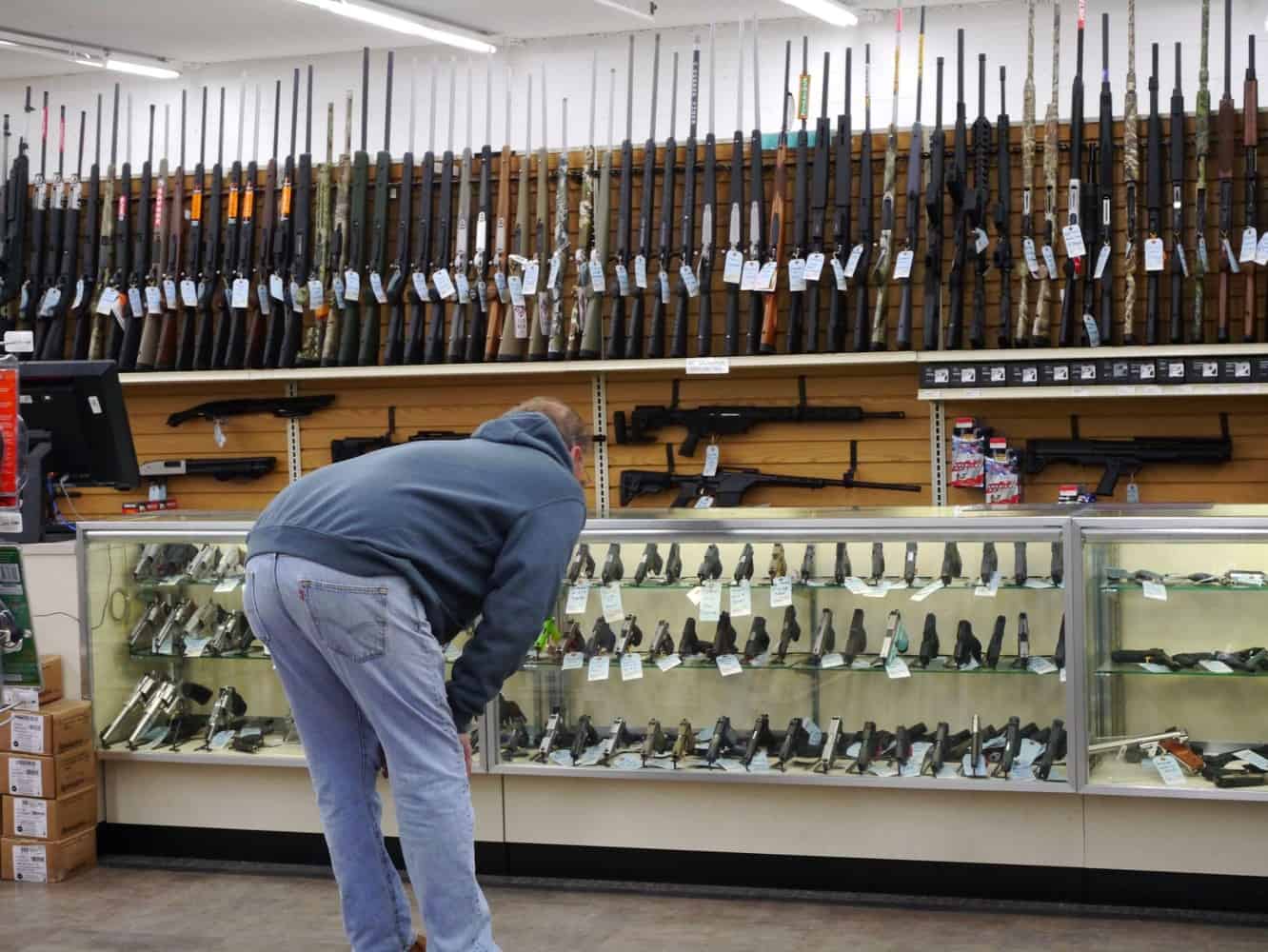
Do people that buy guns prefer a brick-and-mortar store or the one with better deals? How many people shop in person versus online when looking to purchase a firearm or ammunition?
GunMade is your reliable source for fact-based information about the firearm industry; no fuss, no drama. We try to keep everything neutral and straightforward to keep our readers educated and informed.
During this survey, four primary themes were teased out:
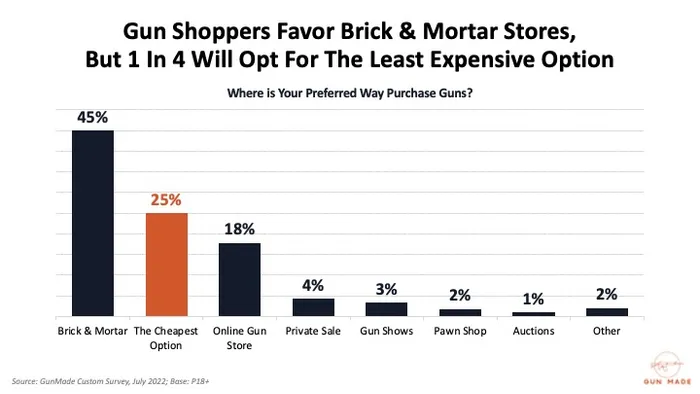
In this survey, most gun-owners prefer a brick-and-mortar store to purchase a firearm (45%). Of those that did not prefer this particular physical platform, 25% preferred the option with the lowest price tag. 18% of those surveyed prefer to buy firearms from an online platform.
In a world where more and more options to buy online are surfacing for all sorts of products, gun purchases included, most prefer the traditional method of going to an actual store. Why is this?
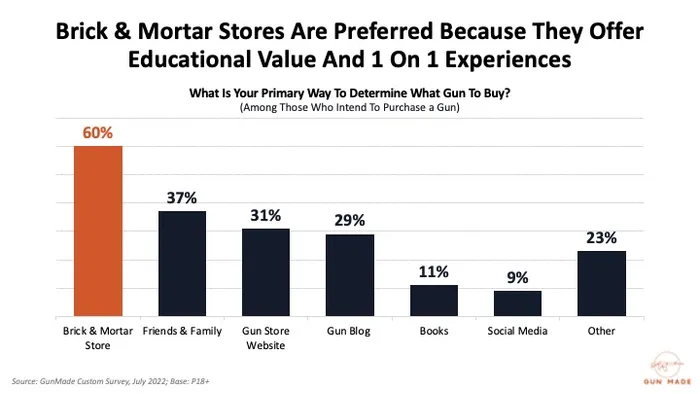
We found that those who chose brick-and-mortar stores to purchase firearms did so because they value the one-on-one experience and educational opportunity.
Buying in person at a designated store helps people discuss and decide which firearm they want to buy with those who are often educated about specific brands, functions, purposes, and even certain quirks a particular gun may have.
The only problem is that sometimes this can limit what consumers can immediately purchase. Certain stores may not carry certain preferred brands; others may only carry a few numbers in their stock or only certain finishes.
Many stores help overcome this potential barrier by having special licenses that allow them to receive firearms purchased directly from a manufacturer or other brick-and-mortar store. A Federal Firearms License (FFL) allows an individual or business to operate this way and receive or mail guns to other businesses or individuals with an FFL.
This means that if someone sees a particular firearm that their preferred gun store doesn’t have, they can see if other store locations have any available and can ship it to their location for purchase.
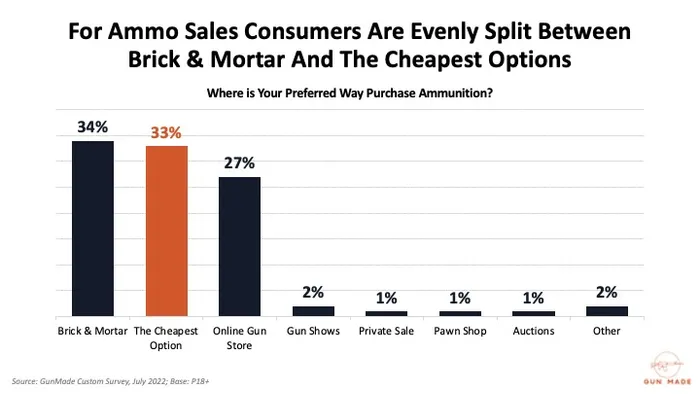
34% of those who responded to the survey said they preferred to buy ammunition at a brick-and-mortar location, followed by 33% responding that they’d choose the cheapest option, regardless of the setting.
This makes some sense if you look back at how many people prefer to purchase a gun in a physical gun store–people often pick up ammunition from the same gun store they just purchased a firearm at while they are already there.
Why do people look for the cheapest ammunition when they value knowledgeable firearm stores so much?
Ammunition generally is easier to understand than a working firearm. Guns are made to operate with specific ammunition, and as long as you remember that caliber, there may not be as much of a value placed on in-person education as there is for the firearm purchase itself.
Some new ammunition variants are on the market; however, if a gun owner is curious about these, the general approach is to buy a box and try it out. While some ammunition may perform differently than others of the same caliber, it may operate between two identical guns differently based on the gun’s wear patterns and individual quirks.
Ordering ammo online and shipping it by mail is generally easier than a firearm, as there are usually just added fees for transporting the product, rather than other paperwork such as FFLs, background checks, and approved mailing locations.
A caveat with buying ammunition loyally at a particular store may be that some stores may not carry certain types of ammunition. Individual stores may carry the most popular kinds of ammunition, whereas some gun owners prefer a very particular type. These people may look elsewhere than a brick-and-mortar store, as it can sometimes cost a store more money to stock only a specific type of ammunition for just one or few purchases.
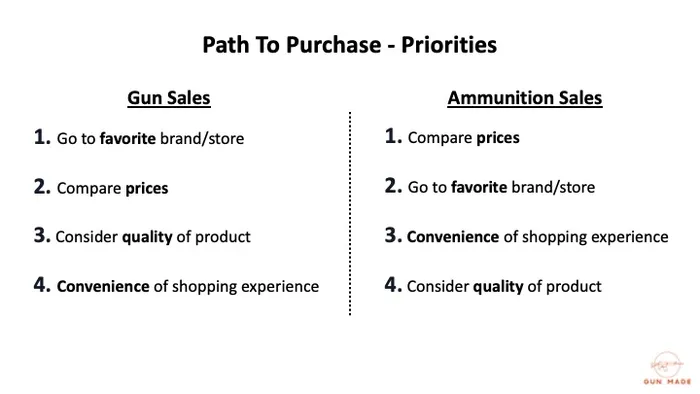
Purchasing guns versus purchasing different ammunition are slightly different. Respondents to our survey confirmed this by establishing different priorities based on which product they intended to purchase.
For gun sales, the top priority for a buyer was to go to their favorite store, followed by comparing the price of the gun they wanted to buy. Considering the quality of their desired product was ranked as a tertiary priority, whereas the convenience of the shopping experience was the lowest level priority.
For ammunition sales, buyers prioritized cost first, followed by loyalty to a favorite brand or store, followed by the convenience of the shopping experience, then considering the quality of their desired product.
So, where do people like to buy their guns and the cartridges to go in them? Is there an element of brand or store loyalty in the firearm industry?
Overall a brick-and-mortar operation wins out in our respondents’ shopping preferences, and the price has a significant hand in it. Of our respondents, most (72%) said they didn’t have a particular store they preferred over another. However, they are inclined to frequent stores with the best prices (62%) and quality (52%).
For the 28% who did have a preferred store for firearm purchases, these were the top-ranked results:
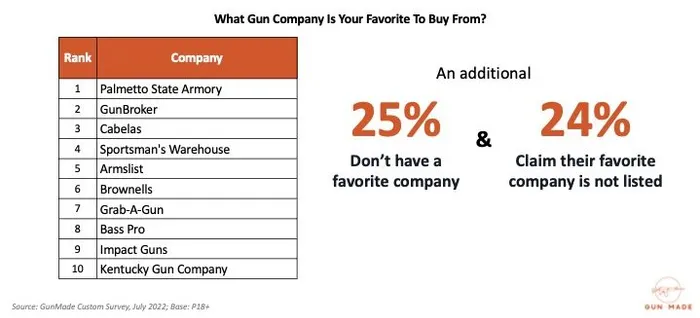
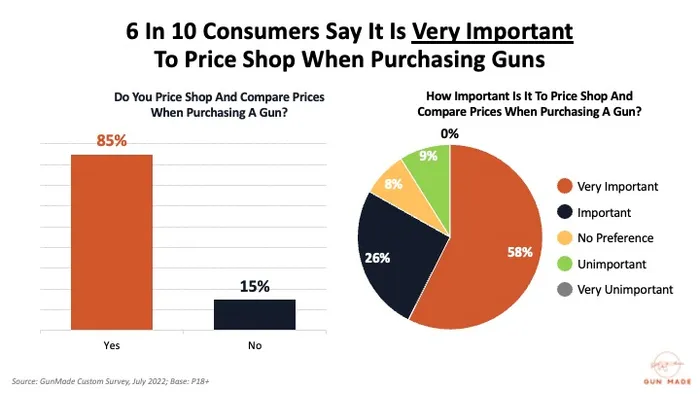
85% of our survey respondents say they compare prices when looking to purchase a firearm, and 58% said it was very important to compare prices when purchasing a gun. This makes sense when considering yearly income demographics. Those that find it necessary to budget for these purchases will naturally want to compare prices before committing.
25% of respondents said they didn’t have a store preference, and the remaining 24% of respondents said their preferred store was not listed in the options given in our survey. Those not listed can include local gun stores not widely advertised except in local communities.
Buying firearms online has additional paperwork and wait times. Most of our respondents were very familiar with the legal process this entails (70% of in-person shoppers and 85% of online shoppers). 90% of our respondents know you can purchase a firearm over the internet; however, only 57% have bought a firearm this way.
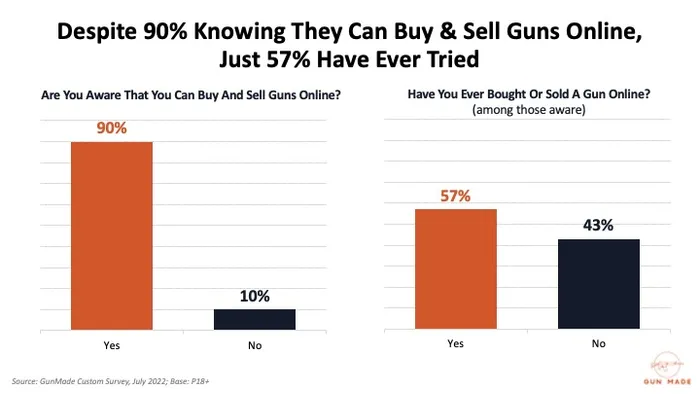
Why don’t more people buy online, especially if prices may be more favorable? The extra paperwork and wait time might be a factor, and there are usually extra fees involved as well.
When buying a gun online, typically, the purchase is made on whatever website you choose to buy your firearm through. You need to find a nearby FFL to secure the firearm transfer and pay an FFL transfer fee at pickup, in addition to filling out the necessary paperwork for the FFL to conduct a background check (ATF form 4473).
Businesses or individuals that hold an FFL and are worth their weight usually take care of most of this for you, aside from filling out the ATF form 4473. Even so, the process generally takes more time than just purchasing a gun from a store.
Online purchasing may let you buy the exact firearm variant you want but may cost extra in wait time, as it takes time to ship a firearm through the mail. It especially takes extra time if a firearm’s being shipped across state lines with certain restrictions and additional policies and procedures in place (the NRA website has a list of these).
For some people, this isn’t a deterrent, and they don’t mind the extra wait for exactly what they want; others may not be so picky or still prefer the in-person experience of a brick-and-mortar from start to finish.
Now more than ever, people have looked to finance purchases other than a house, car, or business loan. The buy now, pay later feature is frequent on websites, and many businesses offer this for firearm purchases.
What’s interesting in our survey is that 88% of firearm purchases among our respondents have not been financed. Most (68%) prefer cash or debit cards as their payment method, and only 30% put a firearm purchase on a credit card.
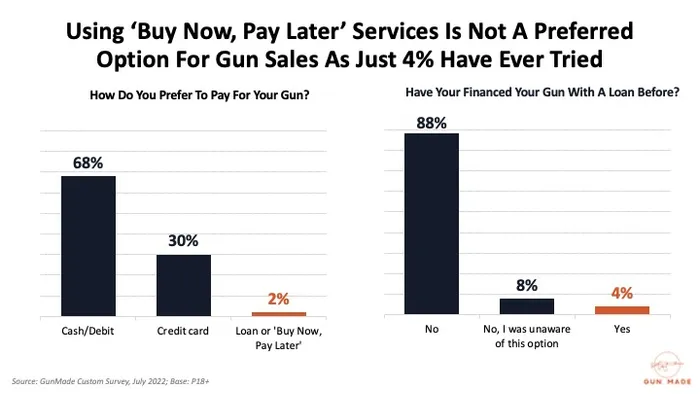
These results could be useful for business owners considering adding a financing platform to their payments systems; people who buy guns don’t prefer a financing option, at least today.
The buy now, pay later options are often through third-party companies. Common online shopping companies outside the firearms industry include Affirm, Afterpay, and even Paypal. Within the firearms industry, fewer companies offer this option for firearm purchases; however, a few bigger names are Credova and, in some situations, Sezzle. Many larger named financing companies restrict using their platform to fund firearms, tobacco products, or drug paraphernalia purchases.
Some credit card companies will not approve using their credit for firearms sales either. Other financial developments may impact this moving forward; however, bigger names like Visa and Mastercard can still be used at most gun stores.
Aside from the fintechs creeping into the firearm industry, many gun shops offer their financing for firearms purchases with varying stipulations. Some require a deposit down, others a credit check, others a purchasing agreement if wanting to use a layaway style payment.
In our survey, we asked our respondents why they wanted to buy a gun, as 45% of them purchased a gun this year alone. 43% of respondents purchased a gun only 1-5 years ago.
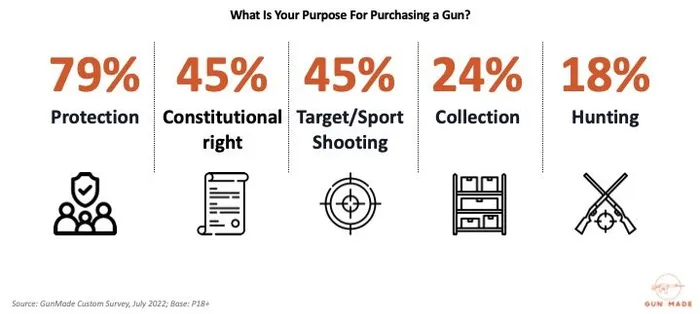
79% of our respondents purchased a gun for personal protection-either for the home or personal protection. 45% said they bought a firearm because it is their constitutional right to do so, 45% purchased for sport or target shooting, 24% purchased a gun to add to their collection, and 18% purchased a hunting firearm.
Those who say they own or purchase a gun because they believe it is their constitutional right to do so often refer to the Second Amendment of the United States Constitution. This amendment’s interpretation has historically held one of controversy.
Compared to 1791, today’s gun laws and regulations are far more extensive, some states more than others. Technology is much more advanced, from guns to ammunition to people. As society has grown, so has the complexity of controversial topics and the need to continue productive discussions.
Despite the interpretation being controversial throughout the centuries, The Founders (both Federalists and Anti-Federalists) came to the agreement that it is the citizen’s responsibility to arm themselves for their own protection from both criminals and a potentially oppressive government.
Today, background checks before being able to purchase and take home a firearm are a hot topic when interpreting the second amendment. Our respondents replied in the form of a Likert scale to the prompt, “background checks need to be stricter to prevent the wrong people from getting guns.”
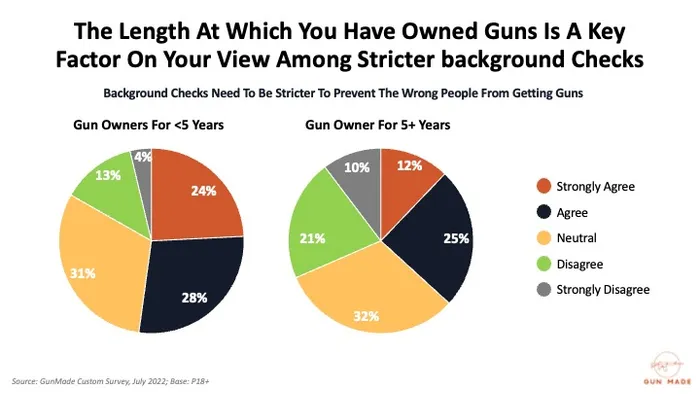
We found that those who owned guns for five or more years agreed less with the tenant than those who have owned guns for less than five years.
Only 37% of those that have owned guns for five or more years strongly agree or agree that “background checks need to be stricter to prevent the wrong people from getting guns,” compared to 52% of those that have been gun owners for less than five years.
Some variables to consider with this result are demographics within this study, including age and gun ownership status.
To reiterate, the four themes we at GunMade found from this survey include:
Almost half of our respondents purchased a firearm this year alone, and those with less firearm education prefer to purchase from a brick-and-mortar location with knowledgeable staff. Most of our respondents recommend to price shop for a gun but are the most inclined to buy at a brick-and-mortar location compared to online, even if they know the legal processes involved in online purchasing.
Most people prefer to use either cash or a debit card when buying a gun. When buying ammunition, most prefer to buy at a brick-and-mortar location, and many price shop without any particular store loyalty.
Most people choose to purchase a firearm for personal or home protection. 45% of respondents claimed that they purchased a firearm because of their belief that it is their constitutional right to do so, and those who said they’ve owned a gun for five or more years responded with less favor for stricter background checks within this survey.
It looks like traditional gun stores are very valuable in the firearms industry in an age of online shopping and will be around for a while. While more online finance options akin to Paypal and Affirm may be on the horizon, most consumers will opt for cash or debit purchases.
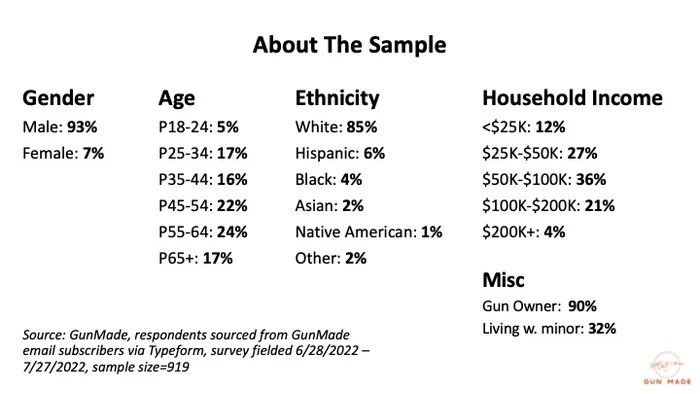
GunMade surveyed 919 of our email subscribers for this survey and of those 919 respondents, the following demographic distribution surfaced:
While this can be considered a relatively small sample size in the grand scheme of total gun owners in the United States (over 81.4 million), this allows transparency for our readers when interpreting these survey results.

 0
0